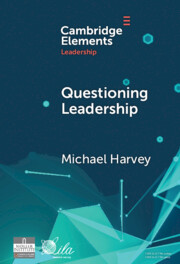Refine search
Actions for selected content:
22 results
Chapter 5 - On Curiosity as Epistemic Vice
-
-
- Book:
- Heidegger's <i>Being and Time</i>
- Published online:
- 28 June 2025
- Print publication:
- 26 June 2025, pp 84-102
-
- Chapter
- Export citation
3 - Inter-disciplinarity and the Law of International Organizations
- from Part I - Thinking International Organisations Differently
-
-
- Book:
- Ways of Seeing International Organisations
- Published online:
- 17 April 2025
- Print publication:
- 24 April 2025, pp 38-56
-
- Chapter
-
- You have access
- Open access
- HTML
- Export citation

Questioning Leadership
-
- Published online:
- 17 June 2024
- Print publication:
- 20 June 2024
-
- Element
- Export citation
5 - Supersessionism and the Politics of Time
- from Part II - Re-orienting Critique in Organization Studies? Exploring Jointly Time and Politics
-
-
- Book:
- Organization as Time
- Published online:
- 22 June 2023
- Print publication:
- 06 July 2023, pp 99-115
-
- Chapter
- Export citation
Chapter 11 - A Non-Ideal Virtue Theory and the Centrality of Education
- from Part II - New Approaches to Moral Education
-
-
- Book:
- Moral Education in the 21st Century
- Published online:
- 01 June 2023
- Print publication:
- 15 June 2023, pp 192-209
-
- Chapter
- Export citation
Chapter 13 - Prudence
- from Part II - Shakespeare’s Virtues
-
-
- Book:
- Shakespeare and Virtue
- Published online:
- 19 January 2023
- Print publication:
- 26 January 2023, pp 137-144
-
- Chapter
- Export citation
Chapter 1 - Aretē (Excellence, Virtue)
- from Part I - Shakespeare and Virtue Ethics
-
-
- Book:
- Shakespeare and Virtue
- Published online:
- 19 January 2023
- Print publication:
- 26 January 2023, pp 21-27
-
- Chapter
- Export citation
On Moral Nose
-
- Journal:
- Cambridge Quarterly of Healthcare Ethics / Volume 33 / Issue 1 / January 2024
- Published online by Cambridge University Press:
- 16 December 2022, pp. 102-111
-
- Article
-
- You have access
- Open access
- HTML
- Export citation
6 - Operationalizing Virtue
-
- Book:
- Virtue in Global Governance
- Published online:
- 28 July 2022
- Print publication:
- 11 August 2022, pp 150-175
-
- Chapter
- Export citation
Chapter 3 - The Goal of Socrates
-
- Book:
- Toward a Process Approach in Psychology
- Published online:
- 14 July 2022
- Print publication:
- 28 July 2022, pp 44-60
-
- Chapter
- Export citation
Chapter 2 - Philosophical Foundations for the Study of Wisdom
- from Part I - Introduction to Wisdom Theory and Research
-
-
- Book:
- The Psychology of Wisdom
- Published online:
- 26 May 2022
- Print publication:
- 09 June 2022, pp 15-34
-
- Chapter
- Export citation
Chapter 13 - Wisdom in the Professions
- from Part IV - Wisdom in the World
-
-
- Book:
- The Psychology of Wisdom
- Published online:
- 26 May 2022
- Print publication:
- 09 June 2022, pp 211-229
-
- Chapter
- Export citation
Chapter Ten - Margaret Cavendish’s Prudence; or, Preservation and Transformation in Playes (1662) and Plays, Never Before Printed (1668)
- from Part III - Literature
-
-
- Book:
- Margaret Cavendish
- Published online:
- 28 April 2022
- Print publication:
- 12 May 2022, pp 158-172
-
- Chapter
- Export citation
2 - What Is Knowledge?
- from Part I - What Is Knowledge?
-
- Book:
- The Quest for Knowledge in International Relations
- Published online:
- 07 April 2022
- Print publication:
- 14 April 2022, pp 31-46
-
- Chapter
- Export citation
5 - Phronesis and Solidarity
-
-
- Book:
- The Cambridge Companion to Gadamer
- Published online:
- 29 July 2021
- Print publication:
- 12 August 2021, pp 117-138
-
- Chapter
- Export citation
Chapter 11 - Aristotle and Socrates in the Eudemian Ethics on the Naturalness of Goodness
- from Part V - The Naturalness of Goodness
-
-
- Book:
- Ancient Ethics and the Natural World
- Published online:
- 13 August 2021
- Print publication:
- 12 August 2021, pp 203-217
-
- Chapter
- Export citation
Sense and sensibility or: remarks on the ‘bounds of (non)sense’
-
- Journal:
- International Theory / Volume 13 / Issue 3 / November 2021
- Published online by Cambridge University Press:
- 28 December 2020, pp. 581-587
-
- Article
-
- You have access
- Open access
- HTML
- Export citation
21 - Ethics and the Study of Discourse
- from Part V - Ethics, Inequality and Inclusion
-
-
- Book:
- The Cambridge Handbook of Discourse Studies
- Published online:
- 28 September 2020
- Print publication:
- 15 October 2020, pp 465-486
-
- Chapter
- Export citation
9 - Justification of Patients’ Trust in Physicians
- from Part III - Justification of Trust
-
- Book:
- Trust in Medicine
- Published online:
- 19 August 2019
- Print publication:
- 22 August 2019, pp 119-142
-
- Chapter
- Export citation
Human flourishing as a foundation for a new sustainability oriented business school curriculum: Open questions and possible answers
-
- Journal:
- Journal of Management & Organization / Volume 17 / Issue 5 / September 2011
- Published online by Cambridge University Press:
- 02 February 2015, pp. 691-710
-
- Article
- Export citation
